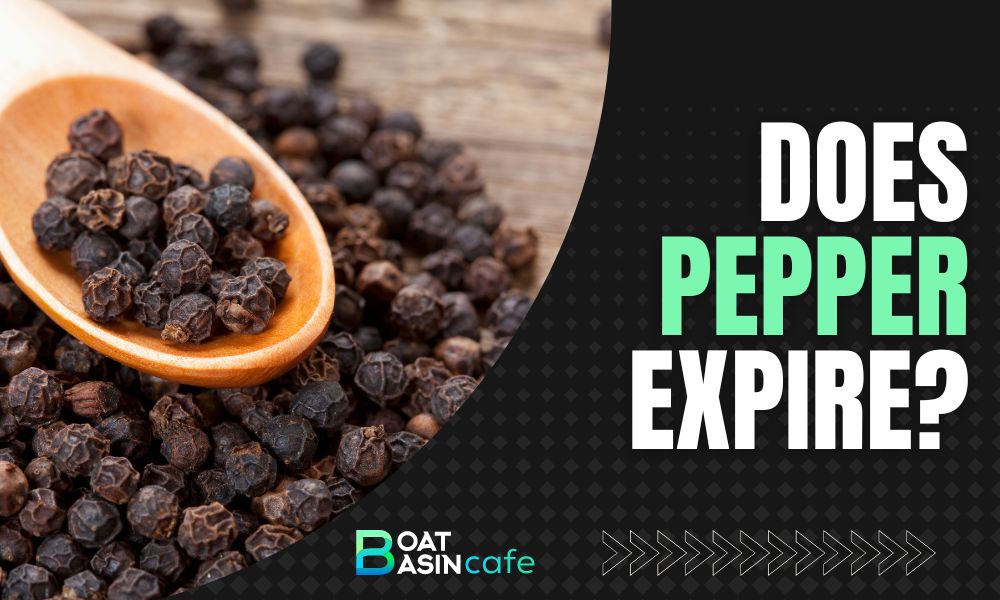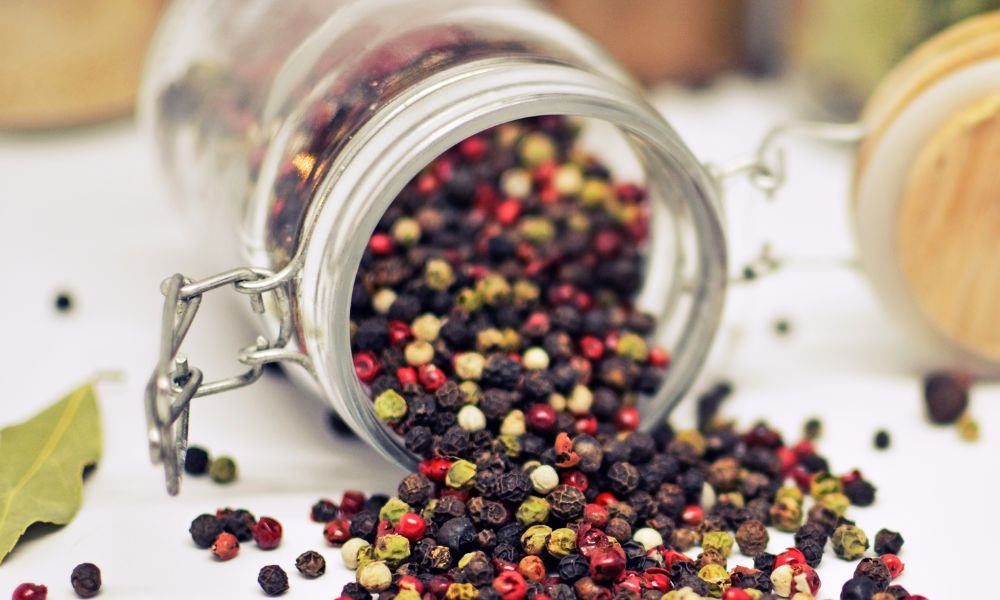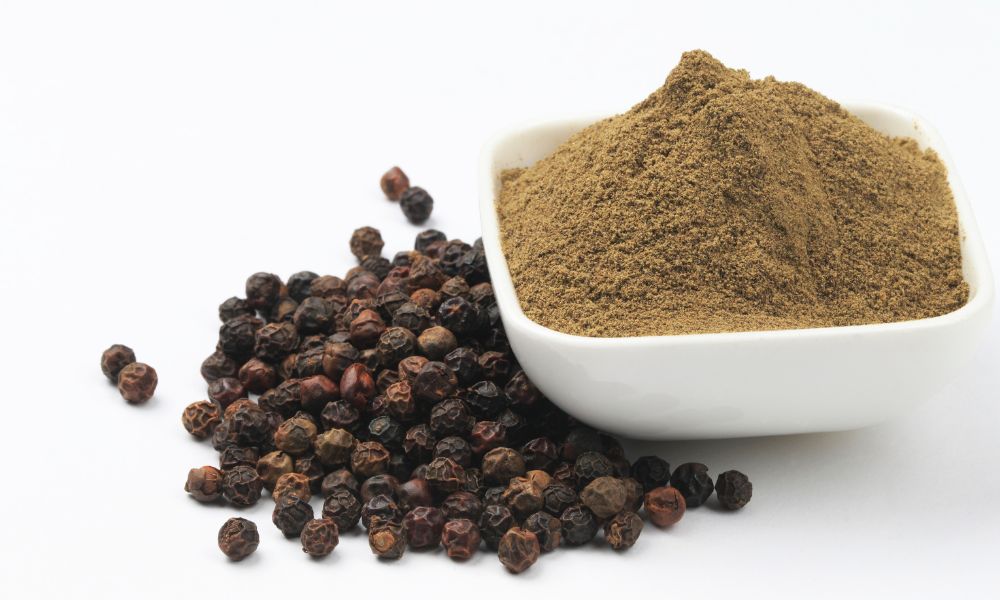We’ve all had that moment: standing in front of the spice cabinet, a recipe in hand, wondering if the pepper lurking in the back is still good to use. If you’ve ever asked yourself, “Does pepper expire?” – you’re not alone. Like many other spices, pepper is an essential ingredient in numerous dishes, and understanding its shelf life and proper storage methods can have a significant impact on our culinary experiences.
In this article, we’ll provide comprehensive information on various aspects of pepper expiration, including its shelf life, signs of spoilage, and even how to make the most of expired pepper through some clever repurposing. Our goal is to help you maintain the flavor and freshness of pepper in your cooking adventures and ensure the best results in your culinary creations.

Understanding Pepper Expiration
The concept of pepper expiration is often misunderstood, leading to premature disposal of this valuable spice or, conversely, using it when it is no longer at its best. Several factors contribute to the expiration process, including oxidation and moisture, which can compromise the taste and potency of pepper. While pepper doesn’t necessarily “expire” in the way that perishable foods do, it does lose its flavor and aroma over time, affecting its performance in recipes.
One crucial distinction to keep in mind is the difference between the shelf life of whole pepper and ground pepper. Whole peppercorns retain their flavor and aroma for much longer than ground pepper due to their protective outer shell. Once ground, pepper is far more susceptible to oxidation and contamination from moisture. In general, whole peppercorns can last up to 4 years if properly stored, while ground pepper’s shelf life is typically around 1 to 2 years.
Signs of Spoiled Pepper
To determine if your pepper is still good to use, it’s essential to understand the visual, olfactory, and taste indicators of spoiled or rancid pepper. While a proper sensory evaluation can be subjective, we’ll provide you with some general guidelines to follow.
Mold
Mold in pepper indicates it has come into contact with moisture, rendering it unsuitable for consumption. In some cases, the mold may not be easily seen, so paying attention to other signs of spoilage is crucial.
Off-Putting Odors
A strong, pungent, or musty smell can signal that your pepper has gone bad. Fresh pepper should have a sharp, earthy aroma that adds to the overall flavor profile of dishes. Rancid pepper may possess smells reminiscent of mildew, chemicals, or other unpleasant scents that would be unwelcome in your culinary creations.
Loss of Flavor
The primary purpose of pepper in recipes is to add flavor and heat; a lack of these attributes could be a sign of expired pepper. To determine if your pepper still has flavor, you can taste a small amount. If it’s bland or lacks its characteristic spiciness, it’s time to replace it.
Proper Storage to Extend Shelf Life

Maintaining your pepper’s freshness largely depends on how you store it. To prolong its shelf life and ensure it stays as flavorful as possible, keep these tips in mind:
Airtight Containers
Exposure to air can accelerate the oxidation process and deteriorate the taste and aroma of your pepper. To prevent this, store your pepper in airtight containers, which help preserve its freshness. If you have bulk pepper or have recently opened a new container, transfer the remaining pepper to a smaller container to minimize air exposure further.
Protect Pepper from Light and Moisture
Storing pepper in a dark, cool, and dry place will help stave off the harmful effects of light and moisture. Exposure to direct sunlight or damp environments can quickly compromise the quality of your pepper and lead to spoiled pepper. Cupboards, pantries, or even specialized spice racks with doors can be ideal storage locations for preventing light and moisture damage.
Labeling Pepper Containers
Keeping track of your pepper’s age is essential to ensuring your using it while it’s still fresh. Labeling your pepper containers with the date of purchase or the pepper expiration date (if available) can be an invaluable reminder to replace your pepper before it goes bad. This simple practice may save your culinary creations and your taste buds from disappointment.
Making the Most of Expired Pepper

While using expired pepper in your favorite recipes may not produce the desired results, it doesn’t mean it’s entirely useless. Before we dive into alternative uses for expired pepper, it’s essential to address any safety concerns.
In general, using expired pepper is not harmful to your health, as it is a dry spice with antimicrobial properties. However, the diminished flavor and aroma can affect the quality and enjoyment of your dishes. With that in mind, here are some alternative uses for slightly expired pepper:
Repurposing in Spice Blends
By mixing expired pepper with other spices, you can create unique spice blends that help mask the loss of flavor and give new life to your pepper. For example, a blend with smoked paprika, cumin, and coriander could be an exciting addition to roasted vegetables, grilled meats, or marinades.
DIY Household Solutions
Slightly expired pepper can also serve various useful purposes around your home. For instance, pepper can be used as a natural pest repellent against ants and other insects. Sprinkling expired ground pepper along doorways, window sills, or other entry points helps deter bugs without exposing you or your family members to harmful chemicals.
The fun part of cooking is the experimentation, embrace it! I once used expired pepper in a homemade potpourri where I combined it with dried flowers, cinnamon, and clove. The result was a pleasantly fragrant mixture that I displayed around my home, giving those old peppercorns a second life.
Adjusting Recipes
When working with expired pepper, making adjustments to your recipes can help compensate for the loss of flavor. By using larger quantities of pepper or incorporating additional spices to bolster the taste profile, you might be able to achieve satisfactory results. Be cautious with your experimentation, though – overloading a dish with pepper could lead to a heavy-handed flavor and an unpalatable dish.
FAQs
Can pepper go bad and make you sick?
Pepper, like other dry spices, has a very low risk of making you sick, thanks to its antimicrobial properties. However, the quality and flavor of pepper can decline over time, making it a less-than-ideal addition to your dishes.
Can you use pepper after the expiration date?
It is generally safe to use pepper past its expiration date; however, its flavor and aroma might be significantly diminished. In such cases, consider alternative uses for expired pepper, such as repurposing it in spice blends or using it in other non-culinary applications.
Does expired pepper lose its spiciness?
Yes, over time, the volatile compounds responsible for pepper’s spiciness will degrade and evaporate, causing the spice to become less potent.
How should I store pepper for long-lasting freshness?
Storing pepper in an airtight container, away from light and moisture is crucial for maintaining its freshness. Cupboards, pantries, or specialized spice racks with doors can provide suitable storage environments for your pepper.
Can I still use pepper if it has a slightly off smell?
If your pepper has an off-putting smell, it could signal a decline in quality or even contamination. It’s best to exercise caution and consider replacing your pepper in such instances.
Can I freeze pepper to extend its shelf life?
While freezing is an effective method for preserving many foods, its impact on the taste and quality of pepper is debatable. While freezing might help slow down oxidation and maintain the freshness of pepper, it could also cause the spice to clump and lose some of its flavor and aroma. We recommend sticking with proper pepper storage methods like airtight containers and avoiding the freezer.
Does ground pepper have a shorter shelf life than whole pepper?
Yes, ground pepper generally has a shorter shelf life than whole peppercorns due to its increased surface area and susceptibility to oxidation and moisture.
Conclusion
Understanding the ins and outs of pepper expiration is crucial to maintaining the quality and enjoyment of your dishes. By properly storing your pepper, paying attention to signs of spoilage, and making informed decisions on using expired pepper, you can ensure a consistently flavorful culinary experience.
Remember to label your containers, store them away from light and moisture, and check them periodically for freshness. When in doubt, rely on your senses to determine the quality of your pepper. And, when it comes time to replace your pepper, embrace your creativity when repurposing those expired peppercorns for household uses or experimenting with different spice blends.
With these insights, we hope you’re better equipped to make the most of your pepper and enjoy the rewards of a tasty and aromatic kitchen.
References
- American Spice Trade Association (2019). Food Safety Education – Shelf-Stable Foods.
- Centers for Disease Control and Prevention (2013). Antimicrobial Properties of Spices.
- Clemson Cooperative Extension (2012). How to Store Your Pantry Staples.
- Department of Agriculture. (2020). Improving pantry storage.
- FoodKeeper App by the USDA USDA FoodKeeper